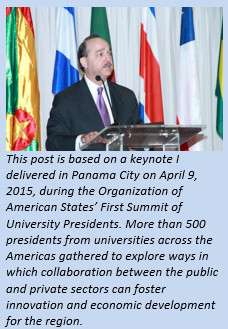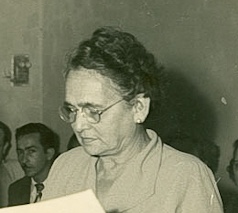Since their origins, universities have contributed to economic development. As fountains of knowledge, universities create an environment where innovation can take place, where new ideas can be hatched, where great minds are forged, and where the next generation of professionals prepares to transfer all that knowledge to society, fueling economic development.
The Connected Society
The correlation between universities and innovation becomes more important now that we are on the cusp a connected society.
Innovation is taking place at warp speed; too fast for companies and research institutions to work alone. Today, collaboration across industries, segments and regions is a necessity.
New software development technologies, combined with ubiquitous mobility and cloud infrastructure, are dramatically changing the way we live, work and play.
One of the basic tenants of this transformation is that we’re moving from a hardware-driven to a software-driven world. Not only is technology changing; we will all need to change as well. Whether we are teachers, engineers, doctors, accountants, or retail sales professionals, we will all need different skills sets to take advantage of new software capabilities.
Internet of Things
In this software-driven world, no category is more important than what we’re calling the Internet of Things. By Internet of Things we mean all the devices – except tablets and smartphones — that can and will be connected to the Internet. That includes wearables like watches, sensors, trackers, alarms, monitors, cameras, cars, homes. You name it.
It’s anticipated that between now and 2020 there will be about 50 billion things connected to the Internet of Things worldwide. They will monitor your home, making it more secure. They will connect your car. They will track cargo containers, trucks, tractors, even garbage cans. They will help make learning available to all. And, they will help keep us healthier.
Getting to the Future First
It’s an exciting time, indeed, and I see a future full of opportunities ahead.
From an industry point of view, technology is evolving at such a fast pace, we can no longer wait for ideas to come to us. We have to go to where great ideas are being generated and invest in their development. We call it “getting to the future first.”
In this regard, we have invested in five centers of innovation for our business – or “Foundries” – as in “foundries of ideas – places where ideas are being forged.” We placed them near some of the major modern research universities and centers of innovation. Like in Palo Alto, California, near Stanford; in Atlanta, at the Georgia Institute of Technology campus; in Dallas, our company headquarters, where we actually have two foundries. (By the way, one of those two foundries in Dallas is entirely focused on the Internet of Things solutions.) And we also have a foundry in Tel Aviv – which we view as a major world center of innovation.
Collaboration and the Modern Research University
 There has long been a connection between industry and universities. In fact, industry funded the creation of what today are top research universities, like Cornell, Johns Hopkins, the University of Chicago and Stanford. And industry has typically been a strong financial supporter of higher education.
There has long been a connection between industry and universities. In fact, industry funded the creation of what today are top research universities, like Cornell, Johns Hopkins, the University of Chicago and Stanford. And industry has typically been a strong financial supporter of higher education.
But the kind of collaboration that is needed now involves a closer, more engaged relationship that involves not just financial support, but sharing of ideas and resources.
As an example of what I’m talking about, I’d like to share our very successful experience with the Georgia Institute of Technology, better known as Georgia Tech.
The Georgia Tech Experience
Georgia Tech consistently ranks among the top engineering schools in the world. It’s also one of the best in the US at graduating minority students and women with technical degrees. With progressive leadership under President “Bud” Peterson, Georgia Tech is today a leading innovator and partner with industry. It has a top-rated advanced technology incubator where 90% of its members become successful within five years of graduation. And it has a venture lab that has launched more than 150 start-up companies since 2001, based on Georgia Tech research and ideas, and has attracted more than $700-million in funding.
One of the ways we are collaborating with Georgia Tech is with the Atlanta Foundry, which is located at Georgia Tech’s award-winning Technology Square. In fact, we felt so good about what that foundry was creating that we built another innovation center in Atlanta, also near the Georgia Tech campus. It’s the AT&T Drive Studio, which we believe to be the first of its kind in the world. There, our engineers work with car manufacturers to connect the cars of the 21st century.
When universities develop a good public/private innovation ecosystem like that, it attracts other industry players. That’s why we are not the only company at Georgia Tech. You now have Coca-Cola, NCR, the Home Depot, and Panasonic making investments next to the AT&T Foundry. Clearly, all this activity is going to lead to growth and economic development.
Investing in Education
We strongly believe innovation and prosperity begin with education. That’s why, since 2008, we have pledged $350 million to AT&T Aspire, our commitment to prepare learners for success in school and in the 21st-Century workforce.
One of the most innovative programs we are funding is an online master’s degree in computer science from Georgia Tech. It’s offered through the Silicon Valley education innovator Udacity, and is being funded with a $2 million contribution from AT&T Aspire.
This is the very first time that a master‘s degree in computer science can be earned exclusively though the massive open online course (MOOC) format – and it is fully equivalent to the degree students get at Georgia Tech on campus.
This program is making it easier for a larger pool of qualified applicants from anywhere in the world to be able to get a master’s degree in computer science, from a top university, at a fraction of the cost of the traditional program (that is, about $7,000) –but with the same academic rigor as the masters offered by Georgia Tech on campus.
It’s a bold move by Georgia Tech that will take higher education to the next level. And we’re proud to be a part of it.
Fountains of Knowledge
Just like the very first universities in the 10th and 11th centuries, today’s modern research universities fulfill their promise of serving as fountains of innovation where new ideas can be hatched and developed, for the betterment of society.
Collaboration between industry and universities is key to economic development and prosperity in our connected society. It will revolutionize the way we live, learn, work, and play. The future holds great opportunity for those that are prepared and get there first.
Are you ready?



